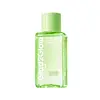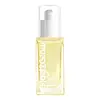What's inside
What's inside
 Key Ingredients
Key Ingredients

 Benefits
Benefits

 Concerns
Concerns

No concerns
 Ingredients Side-by-side
Ingredients Side-by-side

Water
Skin ConditioningHydroxyethyl Urea
HumectantMethylpropanediol
Solvent1,2-Hexanediol
Skin ConditioningPentylene Glycol
Skin ConditioningPolyglycerin-3
HumectantHydroxyacetophenone
AntioxidantBis-PEG-18 Methyl Ether Dimethyl Silane
EmollientCentella Asiatica Leaf Extract
Skin ConditioningCeramide NP
Skin ConditioningButylene Glycol
HumectantHyaluronic Acid
HumectantAllantoin
Skin ConditioningMaltodextrin
AbsorbentAbronia Villosa Leaf Extract
Skin ConditioningSilk Amino Acids
HumectantGentiana Scabra Root Extract
Skin ConditioningSodium Hyaluronate
HumectantMenthol
MaskingCastanea Sativa Seed Extract
Skin ConditioningHelianthus Annuus Seed Extract
Skin ConditioningMenthyl Lactate
MaskingPEG-35 Castor Oil
EmulsifyingGlycine Soja Seed Extract
Skin ConditioningSecale Cereale Seed Extract
AbrasivePyrus Cydonia Seed Extract
MaskingHibiscus Abelmoschus Seed Extract
MaskingPanicum Miliaceum Seed Extract
Skin ConditioningGlycerin
HumectantPEG-40 Hydrogenated Castor Oil
EmulsifyingGlyceryl Polymethacrylate
PPG-26-Buteth-26
Skin ConditioningXanthan Gum
EmulsifyingDisodium EDTA
PEG-50 Hydrogenated Castor Oil
EmulsifyingNonoxynol-14
Propylene Glycol
HumectantBHT
AntioxidantEthylhexylglycerin
Skin ConditioningWater, Hydroxyethyl Urea, Methylpropanediol, 1,2-Hexanediol, Pentylene Glycol, Polyglycerin-3, Hydroxyacetophenone, Bis-PEG-18 Methyl Ether Dimethyl Silane, Centella Asiatica Leaf Extract, Ceramide NP, Butylene Glycol, Hyaluronic Acid, Allantoin, Maltodextrin, Abronia Villosa Leaf Extract, Silk Amino Acids, Gentiana Scabra Root Extract, Sodium Hyaluronate, Menthol, Castanea Sativa Seed Extract, Helianthus Annuus Seed Extract, Menthyl Lactate, PEG-35 Castor Oil, Glycine Soja Seed Extract, Secale Cereale Seed Extract, Pyrus Cydonia Seed Extract, Hibiscus Abelmoschus Seed Extract, Panicum Miliaceum Seed Extract, Glycerin, PEG-40 Hydrogenated Castor Oil, Glyceryl Polymethacrylate, PPG-26-Buteth-26, Xanthan Gum, Disodium EDTA, PEG-50 Hydrogenated Castor Oil, Nonoxynol-14, Propylene Glycol, BHT, Ethylhexylglycerin
Water
Skin ConditioningDipropylene Glycol
HumectantPEG/PPG-17/6 Copolymer
SolventPEG/PPG/Polybutylene Glycol-8/5/3 Glycerin
HumectantPropolis Extract
Skin ConditioningSodium Hyaluronate
HumectantSodium Acetylated Hyaluronate
HumectantHydrolyzed Sodium Hyaluronate
Skin ConditioningSodium Hyaluronate Crosspolymer
HumectantHoney Extract
HumectantCentella Asiatica Extract
CleansingCeramide EOP
Skin ConditioningCeramide Ns
Skin ConditioningCeramide Ng
Skin ConditioningCeramide AP
Skin ConditioningHydrogenated Lecithin
EmulsifyingCeramide As
Skin ConditioningCeramide NP
Skin ConditioningPanthenol
Skin ConditioningAllantoin
Skin ConditioningPullulan
Ethylhexylglycerin
Skin ConditioningHydroxyethylcellulose
Emulsion StabilisingGlycerin
HumectantTrehalose
HumectantSophora Flavescens Root Extract
AntioxidantOpuntia Ficus-Indica Stem Extract
Skin ConditioningOphiopogon Japonicus Root Extract
Skin ConditioningPentylene Glycol
Skin Conditioning1,2-Hexanediol
Skin ConditioningDisodium EDTA
Butylene Glycol
HumectantSodium Acetate
BufferingCellulose
AbsorbentGentiana Scabra Extract
HumectantWater, Dipropylene Glycol, PEG/PPG-17/6 Copolymer, PEG/PPG/Polybutylene Glycol-8/5/3 Glycerin, Propolis Extract, Sodium Hyaluronate, Sodium Acetylated Hyaluronate, Hydrolyzed Sodium Hyaluronate, Sodium Hyaluronate Crosspolymer, Honey Extract, Centella Asiatica Extract, Ceramide EOP, Ceramide Ns, Ceramide Ng, Ceramide AP, Hydrogenated Lecithin, Ceramide As, Ceramide NP, Panthenol, Allantoin, Pullulan, Ethylhexylglycerin, Hydroxyethylcellulose, Glycerin, Trehalose, Sophora Flavescens Root Extract, Opuntia Ficus-Indica Stem Extract, Ophiopogon Japonicus Root Extract, Pentylene Glycol, 1,2-Hexanediol, Disodium EDTA, Butylene Glycol, Sodium Acetate, Cellulose, Gentiana Scabra Extract
 Reviews
Reviews

Ingredients Explained
These ingredients are found in both products.
Ingredients higher up in an ingredient list are typically present in a larger amount.
1,2-Hexanediol is a synthetic liquid and another multi-functional powerhouse.
It is a:
- Humectant, drawing moisture into the skin
- Emollient, helping to soften skin
- Solvent, dispersing and stabilizing formulas
- Preservative booster, enhancing the antimicrobial activity of other preservatives
Allantoin is a soothing ingredient known for its protective and moisturizingg properties. Because of this, it is often added to products with strong active ingredients.
Studies show higher concentrations of this ingredient can promote wound healing.
Though it can be derived from the comfrey plant, allantoin is produced synthetically for cosmetic products to ensure purity.
Learn more about AllantoinButylene Glycol (or BG) is used within cosmetic products for a few different reasons:
Overall, Butylene Glycol is a safe and well-rounded ingredient that works well with other ingredients.
Though this ingredient works well with most skin types, some people with sensitive skin may experience a reaction such as allergic rashes, closed comedones, or itchiness.
Learn more about Butylene GlycolCeramide NP is a type of ceramide.
Ceramides are intercellular lipids naturally found in our skin that bonds dead skin cells together to create a barrier. They are known for their ability to hold water and thus are a great ingredient for dry skin.
Ceramides are an important building block for our skin barrier. A stronger barrier helps the skin look more firm and hydrated. By bolstering the skin ceramides act as a barrier against irritating ingredients. This can help with inflammation as well.
If you would like to eat ceramides, sweet potatoes contain a small amount.
Read more about other common types of ceramides here:
Ceramide AP
Ceramide EOP
Disodium EDTA plays a role in making products more stable by aiding other preservatives.
It is a chelating agent, meaning it neutralizes metal ions that may be found in a product.
Disodium EDTA is a salt of edetic acid and is found to be safe in cosmetic ingredients.
Learn more about Disodium EDTAEthylhexylglycerin (we can't pronounce this either) is commonly used as a preservative and skin softener. It is derived from glyceryl.
You might see Ethylhexylglycerin often paired with other preservatives such as phenoxyethanol. Ethylhexylglycerin has been found to increase the effectiveness of these other preservatives.
Glycerin is already naturally found in your skin. It helps moisturize and protect your skin.
A study from 2016 found glycerin to be more effective as a humectant than AHAs and hyaluronic acid.
As a humectant, it helps the skin stay hydrated by pulling moisture to your skin. The low molecular weight of glycerin allows it to pull moisture into the deeper layers of your skin.
Hydrated skin improves your skin barrier; Your skin barrier helps protect against irritants and bacteria.
Glycerin has also been found to have antimicrobial and antiviral properties. Due to these properties, glycerin is often used in wound and burn treatments.
In cosmetics, glycerin is usually derived from plants such as soybean or palm. However, it can also be sourced from animals, such as tallow or animal fat.
This ingredient is organic, colorless, odorless, and non-toxic.
Glycerin is the name for this ingredient in American English. British English uses Glycerol/Glycerine.
Learn more about GlycerinPentylene glycol is typically used within a product to thicken it. It also adds a smooth, soft, and moisturizing feel to the product. It is naturally found in plants such as sugar beets.
The hydrophilic trait of Pentylene Glycol makes it a humectant. As a humectant, Pentylene Glycol helps draw moisture from the air to your skin. This can help keep your skin hydrated.
This property also makes Pentylene Glycol a great texture enhancer. It can also help thicken or stabilize a product.
Pentylene Glycol also acts as a mild preservative and helps to keep a product microbe-free.
Some people may experience mild eye and skin irritation from Pentylene Glycol. We always recommend speaking with a professional about using this ingredient in your routine.
Pentylene Glycol has a low molecular weight and is part of the 1,2-glycol family.
Learn more about Pentylene GlycolSodium Hyaluronate is hyaluronic acid's salt form. It is commonly derived from the sodium salt of hyaluronic acid.
Like hyaluronic acid, it is great at holding water and acts as a humectant. This makes it a great skin hydrating ingredient.
Sodium Hyaluronate is naturally occurring in our bodies and is mostly found in eye fluid and joints.
These are some other common types of Hyaluronic Acid:
Learn more about Sodium HyaluronateWater. It's the most common cosmetic ingredient of all. You'll usually see it at the top of ingredient lists, meaning that it makes up the largest part of the product.
So why is it so popular? Water most often acts as a solvent - this means that it helps dissolve other ingredients into the formulation.
You'll also recognize water as that liquid we all need to stay alive. If you see this, drink a glass of water. Stay hydrated!
Learn more about Water